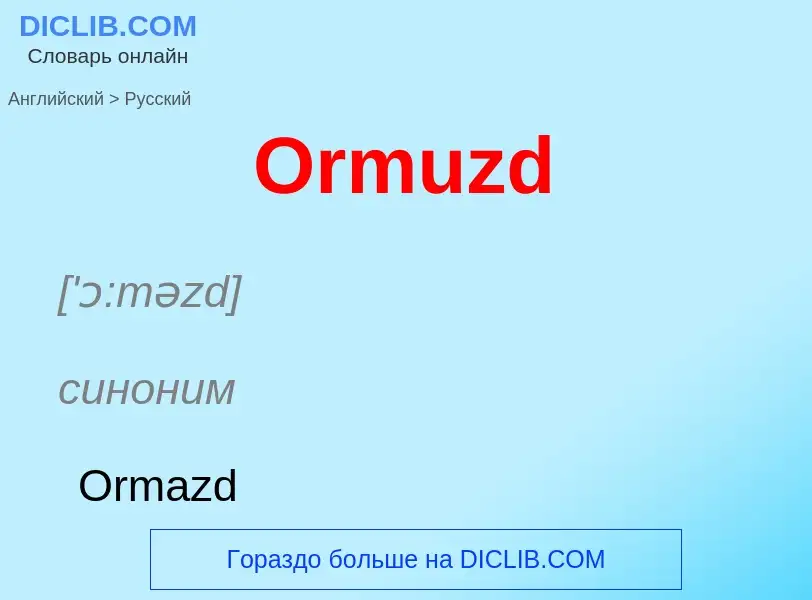Translation and analysis of words by ChatGPT artificial intelligence
On this page you can get a detailed analysis of a word or phrase, produced by the best artificial intelligence technology to date:
- how the word is used
- frequency of use
- it is used more often in oral or written speech
- word translation options
- usage examples (several phrases with translation)
- etymology
Ormuzd - translation to russian
['ɔ:məzd]
синоним
['ɔ:məzd]
существительное
мифология
Ормузд
[pɑ:'si:iz(ə)m]
существительное
общая лексика
парсизм
Definition
Wikipedia
Ahura Mazda (; Avestan: 𐬀𐬵𐬎𐬭𐬋 𐬨𐬀𐬰𐬛𐬃, romanized: Ahurō Mazdā̊; Persian: آهورا مزدا, romanized: Āhurā Mazdā), also known as Oromasdes, Ohrmazd, Ormusd, Ahuramazda, Hoormazd, Hormazd, Hormaz and Hurmuz, is the creator deity in Zoroastrianism. He is the first and most frequently invoked spirit in the Yasna. The literal meaning of the word Ahura is "lord", and that of Mazda is "wisdom".
The first notable invocation of Ahura Mazda occurred during the Achaemenid period (c. 550–330 BC) with the Behistun Inscription of Darius the Great. Until the reign of Artaxerxes II (c. 405/404–358 BC), Ahura Mazda was worshipped and invoked alone in all extant royal inscriptions. With Artaxerxes II, Ahura Mazda was gathered in a triad with Mithra and Anahita. In the Achaemenid period, there are no known representations of Ahura Mazda at the royal court other than the custom for every emperor to have an empty chariot drawn by white horses to invite Ahura Mazda to accompany the Persian army on battles. Images of Ahura Mazda, however, were present from the 5th century BC but were stopped and replaced with stone-carved figures in the Sassanid period and later removed altogether through an iconoclastic movement supported by the Sassanid dynasty.

![[[Stater]] of [[Tiribazos]], Satrap of Lydia, c. 380 BC showing Ahura Mazda [[Stater]] of [[Tiribazos]], Satrap of Lydia, c. 380 BC showing Ahura Mazda](https://commons.wikimedia.org/wiki/Special:FilePath/CILICIA, Soloi. Tiribazos, Satrap of Lydia. Second reign, 388-380 BC.jpg?width=200)
![The [[Behistun Inscription]] contains many references to Ahura Mazda. The [[Behistun Inscription]] contains many references to Ahura Mazda.](https://commons.wikimedia.org/wiki/Special:FilePath/Darius I the Great's inscription.jpg?width=200)
![Pahlavi]] inscription: "The Mazda worshipper, the divine Hormizd the great [[Kushan]] king of kings"/ Pahlavi inscription: "Exalted god, Hormizd the great Kushan king of kings", Hormizd standing right, holding investiture wreath over altar and raising left hand in benedictional gesture to [[Anahita]] holding investiture wreath and sceptre. [[Merv]] mint. Pahlavi]] inscription: "The Mazda worshipper, the divine Hormizd the great [[Kushan]] king of kings"/ Pahlavi inscription: "Exalted god, Hormizd the great Kushan king of kings", Hormizd standing right, holding investiture wreath over altar and raising left hand in benedictional gesture to [[Anahita]] holding investiture wreath and sceptre. [[Merv]] mint.](https://commons.wikimedia.org/wiki/Special:FilePath/Hormizd I Kushanshah Merv mint.jpg?width=200)

![CE]] at [[Ostia Antica]], Italy (CIMRM 312) CE]] at [[Ostia Antica]], Italy (CIMRM 312)](https://commons.wikimedia.org/wiki/Special:FilePath/Leontocephaline-Ostia.jpg?width=200)
![Ahura Mazda (on the right, with high crown) presents [[Ardashir I]] (left) with the ring of kingship. ([[Naqsh-e Rustam]], 3rd century AD) Ahura Mazda (on the right, with high crown) presents [[Ardashir I]] (left) with the ring of kingship. ([[Naqsh-e Rustam]], 3rd century AD)](https://commons.wikimedia.org/wiki/Special:FilePath/Naqsh i Rustam. Investiture d'Ardashir 1.jpg?width=200)
![Khosrau Parviz]] with Ahura Mazda presenting the [[diadem]] of sovereignty on the right. [[Taq-e Bostan]], [[Iran]]. Khosrau Parviz]] with Ahura Mazda presenting the [[diadem]] of sovereignty on the right. [[Taq-e Bostan]], [[Iran]].](https://commons.wikimedia.org/wiki/Special:FilePath/Taq-e Bostan - High-relief of Anahita, Khosro II, Ahura Mazda.jpg?width=200)
.jpg?width=200)
![A scene from the [[Hamzanama]] where [[Hamza ibn ‘Abd al-Muttalib]] Burns Zarthust's Chest and Shatters the Urn with his Ashes A scene from the [[Hamzanama]] where [[Hamza ibn ‘Abd al-Muttalib]] Burns Zarthust's Chest and Shatters the Urn with his Ashes](https://commons.wikimedia.org/wiki/Special:FilePath/Hamza Burns Zarthust’s Chest and Shatters the Urn with his Ashes.jpg?width=200)
![Painted clay and [[alabaster]] head of a possible [[Zoroastrian]] priest wearing a [[Bactria]]n-style headdress, [[Takhti-Sangin]], [[Tajikistan]], [[Greco-Bactrian kingdom]], 3rd–2nd century BCE Painted clay and [[alabaster]] head of a possible [[Zoroastrian]] priest wearing a [[Bactria]]n-style headdress, [[Takhti-Sangin]], [[Tajikistan]], [[Greco-Bactrian kingdom]], 3rd–2nd century BCE](https://commons.wikimedia.org/wiki/Special:FilePath/Head of Bactrian ruler (Satrap), Temple of the Oxus, Takht-i-Sangin, 3rd-2nd century BC.jpg?width=200)
.jpg?width=200)
, Uzbekistan, 7-8th century CE.jpg?width=200)
![Parsi]]'' Wedding, 1905 Parsi]]'' Wedding, 1905](https://commons.wikimedia.org/wiki/Special:FilePath/Parsee Wedding 1905.jpg?width=200)

![A modern Zoroastrian [[fire temple]] in [[Western India]]<!-- please don't name it, could be confused with the Iranshah --> A modern Zoroastrian [[fire temple]] in [[Western India]]<!-- please don't name it, could be confused with the Iranshah -->](https://commons.wikimedia.org/wiki/Special:FilePath/Pundole Agiary Udvada.jpg?width=200)
![[[Sadeh]] in [[Tehran]], 2011 [[Sadeh]] in [[Tehran]], 2011](https://commons.wikimedia.org/wiki/Special:FilePath/Sadeh.jpg?width=200)
![A special container carrying the holy fire from [[Aden]] to the Lonavala Agiary, India A special container carrying the holy fire from [[Aden]] to the Lonavala Agiary, India](https://commons.wikimedia.org/wiki/Special:FilePath/Special Container Carrying The Holy Fire from Aden at Lonavala.jpg?width=200)
![fire temple]] of [[Baku]], c. 1860 fire temple]] of [[Baku]], c. 1860](https://commons.wikimedia.org/wiki/Special:FilePath/USSHER(1865) p012 BAKU, FIRE TEMPLE (cropped).jpg?width=200)
![Chak Chak]] in [[Yazd]], [[Iran]]. Chak Chak]] in [[Yazd]], [[Iran]].](https://commons.wikimedia.org/wiki/Special:FilePath/Zoroastrian Persian Shrine chak-chak Republic Ardakan.jpg?width=200)

